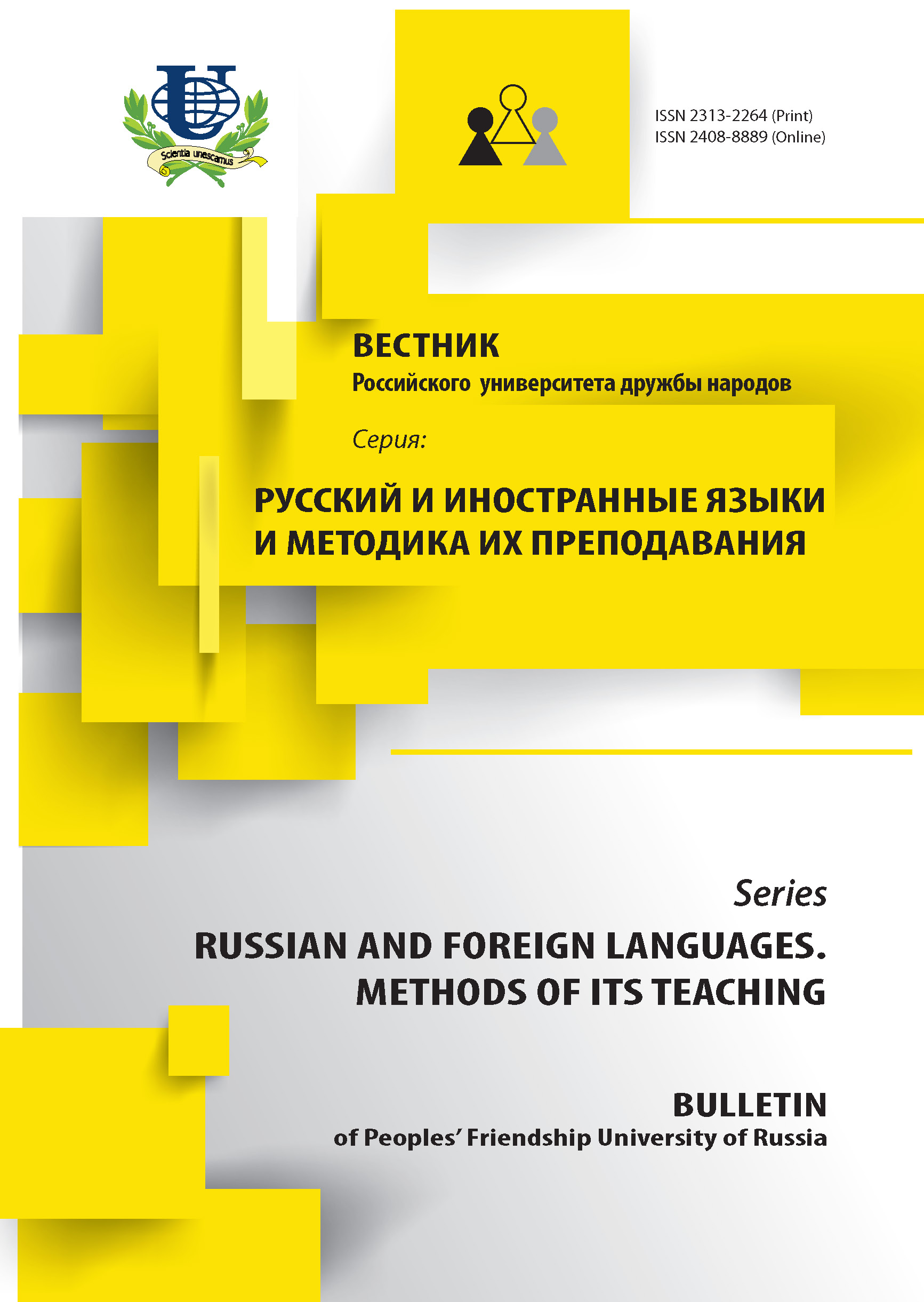No 4 (2014)
- Year: 2014
- Articles: 23
- URL: https://journals.rudn.ru/russian-language-studies/issue/view/609
Articles
Discussion as an interactive form of teaching russian as a foreign language
Abstract
The article is devoted to the actual problem of the ways of optimization the educational process at the University in the sphere of Russian as a foreign language. In particular, the author describes discussion and methods and forms of its usage in teaching Russian as a foreign language.
Russian Language Studies. 2014;(4):5-11
 5-11
5-11


 12-16
12-16


Educational summarizing of scientific texts on the object properties
Abstract
The article analyses the essential rules of summarizing scientific texts on the object properties for the students of technical and natural sciences. It examines sample modifications of sentences where the subject has qualitative and quantitative characteristics. The authors present new textbooks for teaching foreign students of different specialties to summarize Russian scientific texts.
Russian Language Studies. 2014;(4):17-24
 17-24
17-24


 25-31
25-31


 32-37
32-37


 38-45
38-45


Students-bilinguals’ communicative and speaking activity: types, criteria, levels
Abstract
This article examines the problems of communicative-speaking activity: peculiarities of its manifestation, reasons of speaking inactivity, types, criteria and levels of communicative-speaking activity; organization forms of the educational process, increasing students communicative-speaking activity). Its formation provides students-bilinguals with a free operative speech hold.
Russian Language Studies. 2014;(4):46-51
 46-51
46-51


Verbal component of synthetic linguistic personality in russian rock sub-culture
Abstract
In the framework of this material we consider the specific features of functioning of slang conceptual codes in the structure of the verbal component of synthetic lingual personality in the space of the subculture epoch of the Russian rock which is a part of the modern music discourse.
Russian Language Studies. 2014;(4):52-58
 52-58
52-58


Harmonization of international relations - a meaningful didactic factor in teaching russian as a foreign language
Abstract
The use of the principle of harmonization of international relations in teaching Russian as a foreign language is proved. The implementation of the mentioned vital didactic principle in academic, scientific and methodological work of the Chair of the Russian Language is described.
Russian Language Studies. 2014;(4):59-66
 59-66
59-66


Electronic presentation as a teaching professional communication genre
Abstract
The features of oral presentation as a genre of teaching professional communication are considered in the context of lectures and workshops on the theory and practice of intercultural communication at the university. It is shown that the use of electronic presentations, structuring lecture’s content in accordance with its logic is the most effective method of classroom organization in modern high school practice with the help of information technology.
Russian Language Studies. 2014;(4):67-73
 67-73
67-73


 74-79
74-79


 80-84
80-84


 85-89
85-89


Realia classification in russian and persian languages
Abstract
Russian Realia have been studied and classified by many scientists. Realia of Persian language have not been studied yet well. This article presents the classification of Persian realia on the basis of classification Russian realia, similarities and distinctions between these classifications are noted.
Russian Language Studies. 2014;(4):90-97
 90-97
90-97


Teaching eastern languages today: communicative instruction
Abstract
Mismatching of foreign language teaching methods and learners’ intentions has become a topic problem in teaching Eastern languages. The article describes this problem and proposes the principle of communication-focused instruction as a way of answering learners’ needs.
Russian Language Studies. 2014;(4):98-103
 98-103
98-103


Lexical and semantic transformations of spanish poetry recurring images in russian translations
Abstract
The article deals with lexical and semantic particularities of some typical for the Spanish poetry images. In their translation into the Russian language inevitable and forced modifications occur both in the reviewer and figurative images’ content. This work is dedicated to the linguistic analysis of translation transformations.
Russian Language Studies. 2014;(4):104-113
 104-113
104-113


English equivalents of the russian word ‘advokat’
Abstract
The present paper deals with the problem of translation of Russian legal terms into English. It analyses English equivalents of the Russian term ‘Advokat’, which form a varied nominative lexical-semantic field, while in the Russianlanguage this one word covers almost the entire scope of legal protection. This fact poses a serious problem in translation and in teaching English to Law students. The article compares the semantic dimensions of the terms, analyses their distinctive features, marks their stylistic and functional differences and suggests some practical recommendation for their translation. The results of the study can be applied in the theory and practice of translation and in teaching Professional English to Law students.
Russian Language Studies. 2014;(4):114-119
 114-119
114-119


Linguistic and linguocultural essence of the french language of Canada
Abstract
The French language in Canada has integrated both language and culture; its numerous aspects are reflected in the culture specific linguistic parameters as well as in the scope of linguistic and cultural peculiarities. The article reviews the influence of various factors on the formation of the French language in Canada and explores its peculiarities and culture specific characteristics.
Russian Language Studies. 2014;(4):120-126
 120-126
120-126


Game technology as an innovative method for actualization professional dialogue competence of students-economists
Abstract
The article analyzes the innovative potential of game technology to form professional dialogical competence of students-economists. The author makes a historical excursion, which helps to look at game theory in the format of intersubject scientific interests. The technological model of educational business game is considered. Educational appeal of game technologies to the modern higher school is proved.
Russian Language Studies. 2014;(4):127-132
 127-132
127-132


Linguistic and axiological characteristics of regional identity topos (on the material of poetic discourse about Komsomolsk-on-Amur)
Abstract
The author investigates poetry about Komsomolsk-on-Amur from the point of view of discourse theory. Local poets praise Far Eastern nature, its landscape, citizens' mentality. The above-noted characteristics make up linguistic and axiological domain of regional identity.
Russian Language Studies. 2014;(4):133-139
 133-139
133-139


 140-145
140-145


Monograph “Actual problems of the russian language and speech culture”. edited by doctor of philology L.N. Mikheeva. Ivanovo state university of chemistry and technologies. - Ivanovo, 2014. - 359 pp
Russian Language Studies. 2014;(4):146-148
 146-148
146-148


Our authors
Russian Language Studies. 2014;(4):149-151
 149-151
149-151















